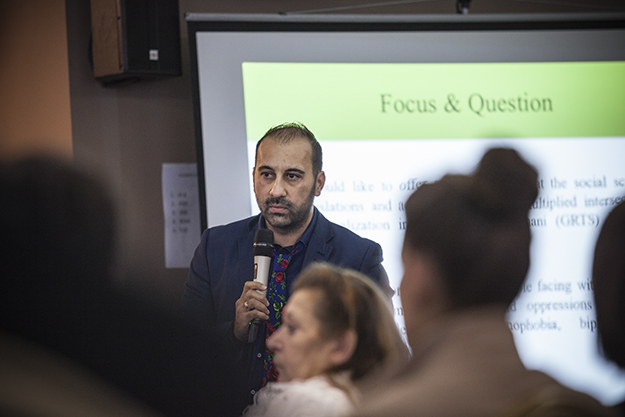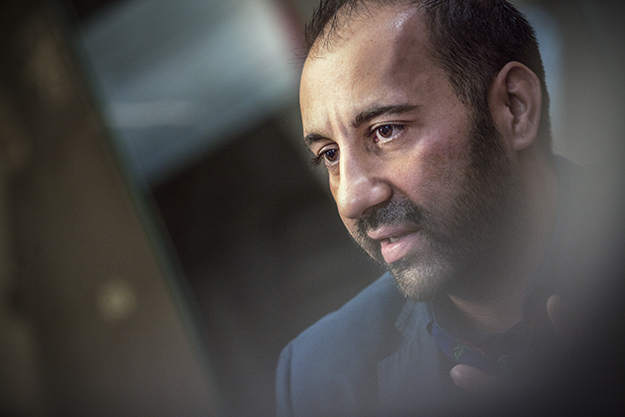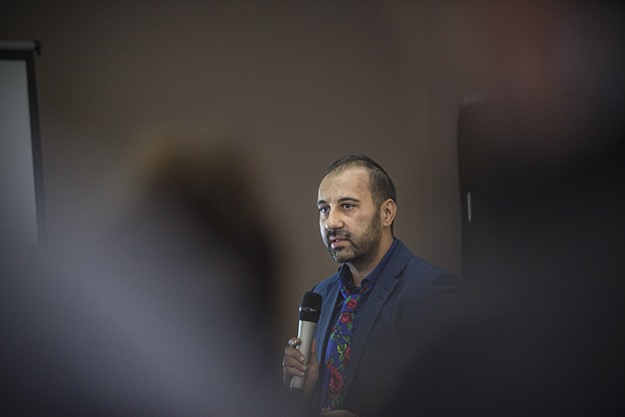As a gay Roma person, Dezso Mate’s own life experience triggered him to dedicate a good amount of his time to researching intersectionality and different forms of oppression.
“The Roma humiliated me because of my sexuality, and sometimes I’m excluded from the LGBTQI [Lesbian,Gay, Bisexual, Transgender, Queer, and Intersex] community because I’m a Roma,” says Dezso.
In December 2018, at the annual Civil Rights Defenders’ Roma Summit in Prishtina, he shared his life story as an illustration of the impact of the intersection of different identities. His mother died when he was six after she had been told that she was pregnant. It later turned out that it was a misdiagnosis; she wasn’t pregnant, she had cancer.
“She felt something wrong in her body. But she wasn’t pregnant,” he says. “She died because of a social system that reinforces stereotypes, like that a Romani woman going to hospital should be pregnant. Not that my story [alone] is important, but thousands of people are in my position whose voice need to be heard. Now, I am lucky to talk about this issue, but it is only one [voice].”
Mate is a consultant with the Open Society Foundations Community Youth Fellowship, which is focusing on the intersectional challenges in public health care settings for Roma LGBT people. Based in Budapest, the 34-year-old is a doctoral researcher at the Eötvös Loránd University Interdisciplinary Program at the city’s Faculty of Social Science. The main focus of his doctoral research is on the multiplied intersectional discrimination against Romani LGBT people.
He was one of the most prominent speakers at the recent Roma Summit, where K2.0 had the opportunity to meet him and discuss his research on the subject, and his efforts to fight oppression by shedding light on the stories and realities of those marginalized in more way than one.

Photo: Majlinda Hoxha / K2.0.
K2.0: Tell me more about your doctoral research on intersectional discrimination of Romani LGBT people?
Dezso Mate: My research [focuses on the] concept of resiliency and social power. I’m researching how the concept of resiliency and social power and different narratives are defining the Romani identity. There are many layers and identities in this group. For example, there are Romani LGBTQI people and Romani women.
I am gay, I am totally fine with it, but before doing my research I didn’t think of the different social oppressions [one might face]. If you don’t start thinking of the different oppressions you might face, you don’t always recognize that the oppression is taking place.
I did 50 interviews with Romani intellectuals, and those included people who are part of the LGBTQI group, and I started to have an interest in their identity. I was introduced to the concept of intersectionality. I found out we are facing different oppressions from society, from both within and outside [our groups].
There are double sources of oppression in our life. For example, there is social power, which is usually a male dominated power and affects not just the LGBTQI community, but also women, people with disabilities, etc., and we just don’t talk about this.
I had an interview with a gay Romani man and asked him, “What is your biggest fear?”
“My biggest fear is that I am existing,” he said.
That is just so scary, to hear that sentence, that his biggest fear in his life is that he exists, because he doesn’t find or cannot find any support from our [communities]. Romani groups are transphobic and homophobic, and xenophobic as a majority, and at the same time, the LGBTQI community excludes Romani people. They exoticize them, eroticize them, or there is a concept of orientalism — for example, a Romani woman has to dance and sing.
How often are the stories of people facing multiple forms of discrimination being heard?
When I had these interviews with those people, one of the first questions I asked was, “How do you consider your identity? What is Romani identity? What is the culture of Romani people?”
Their answers always included those labels, which they hear from the majority of society. Of course, there are some basic symbols, too — for example, the language is our cultural heritage.
We can mention music and dance, but it is kind of an orientalist approach that is ethnographic and anthropological. It’s harming Romani knowledge production and changing the narratives of Romani identity because if you are always talking about different ethnographic studies and talking about the Romani people in ethnographic discourse, it [harmfully simplifies a complex subject] because there are other issues, as well. For example, why are we not talking about Romani feminism? Or the sex work of Romani men and women? These are existing issues, too.

Photo: Majlinda Hoxha / K2.0.
Maybe it’s a taboo to talk about it, but I don’t like the word taboo because it indicates that there are themes and topics that [society] doesn’t want to acknowledge because they are considered to be shameful. [Not talking about ‘taboo’ issues also shows us] who is leading the discourse, and why the discourse is being limited in the way that it is, to topics like housing, education and health.
These are super important things, of course, but these are just the tip of the iceberg, and there are many other layers to the Romani community that we aren’t talking about. For example, if there is a Romani woman who is suffering with a disability [and therefore facing multiple forms of discrimination], what should we do?
What can be done to shed greater light on the multiple layers of Roma identity? How can we help change the societal discourse to make it more representative?
In one research project, my focus was on the difference between Roma generations. The first generation [I interviewed was born in the 50s], the second was [born in] the 70s, and we are the third generation.
My question to them was, “Why didn’t you talk about intersectionality, feminism, or LGBTQI issues in the past?” The answer was easy — at that time, they first had to prove that they existed as a group.
They had to prove the Romani identity, they mentioned the social system that didn’t accept them as a group or ethnicity, and that was the main point for them — to get recognition for their existence as Romani people, and the recognition that they have needs. First, they had to draw the attention of the decision makers to the lack of education, lack of housing and lack of access to health care.
OK, these are the first steps, but times are changing and now there are new narratives. But we are here, and we have to talk about new issues with them, together.


